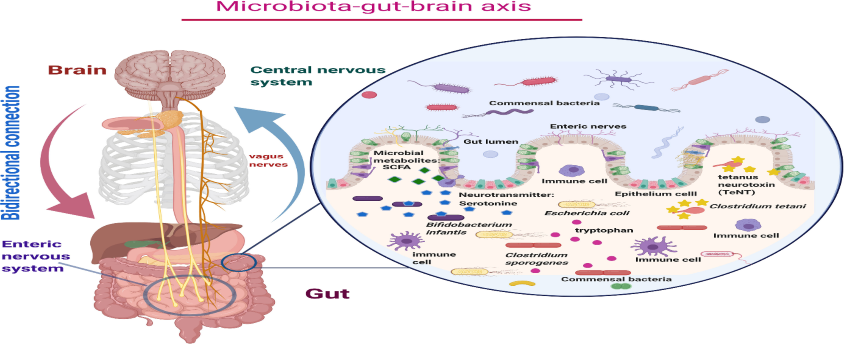The microbiome link to autism disorders
03, Mar 2023

Prelims level : Science & Technology
Mains level : GS-III Science & Technology - Awareness In The Fields Of It, Space, Computers, Robotics, Nano-Technology, Bio-Technology, Pharma Sector & Health Science
Why in News?
- This article tries to establish the link between gut microbiome composition and Autism spectrum disorder.
Autism spectrum disorder (ASD):
- Autism spectrum disorder (ASD) is a neurodevelopmental disability caused by differences in the brain.
- ASD is a complicated developmental disorder characterised by difficulty in social interaction, verbal and nonverbal communication, repetitive behaviour, and a narrow focus of interest.
- ASD is referred to as a “developmental disorder” because symptoms usually appear in the first 2 years of the child.
- Autism is also termed a “spectrum” disorder because there is wide variation in the type and severity of symptoms people experience.
- Currently, there is no cure or therapy available to treat or reverse ASD.
Link between gut microbiome and Autism:
- Although the researchers have still not established the aetiology of ASD completely, there have been reports which say that the gut-brain axis could have a prominent role in causing ASD.
- Aetiology is the study of factors that cause a disorder or disability or disease.
- In recent times, extensive studies on the human microbiome have been undertaken by researchers which have been supported by advances in gene-sequencing technologies and high-end bioinformatic analysis.
- The gut microbiome is found to have a big impact on immune modulation and metabolic activities in humans and differences in gut microbiome composition have been seen with respect to various diseases such as Crohn’s disease, celiac disease and autism.
- Immune modulation refers to the actions undertaken by the immune system of the body to ensure its response is proportionate to a threat.
- Studies on the dynamic cross-talk between the gut microbiome and the host environment have found potential connections to ASD symptoms.
- Example: abnormal antigens which are trafficked through an impaired intestinal barrier allow such antigens to pass through the barrier surrounding the brain which could cause a chain of reactions that worsen ASD symptoms.
- Reports from research have indicated that even if the gut microbiome doesn’t play a direct role, abnormalities in the gut microbiome can induce toxic metabolites and prevent the person from synthesising the metabolites required to produce neurotransmitters that are involved in cognition, behaviour, mood, and sleep.
- For instance, research that involved the study of children with and without ASD:
- Dysbiosis (imbalance) was seen in the gut microbiome of children with ASD.
- The fraction of bacteria of the phylum firmicutes was seen to be higher in the guts of children with ASD.
- Bacteria such as lactobacillaceae, bifidobacteriaceae, and veillonellaceae were also abundantly present in the gut microbiome in children with ASD.
- Further, bacteria such faecalibacterium and roseburia that produce short-chain fatty acids (SCFA) were underrepresented in children with ASD which suggests that lower levels of SCFAs could lead to an imbalance in brain function and behaviour.
Path ahead:
- Recent findings suggest that fixing the gut in ASD-affected children can reduce the toxic burden and help complete the required neurotransmitter synthesis pathways.
- Furthermore, bringing about a balance in the gut microbiome (reversing gut dysbiosis) among children with ASD has the potential to address various problems associated with the disease.
- Faecal microbial transplantation (FMT) is regarded as one of the most promising approaches to reverse gut dysbiosis.
- Under FMT, stool samples from healthy individuals are transplanted into the large intestines of affected children.
- A study conducted by Ohio State University in 2017 on FMT reported that the intervention improved both gastrointestinal and ASD-related symptoms.
- FMT is also a cost-effective approach with minimal risk. However, there is a need to build consensus among all stakeholders in order to adopt it.






